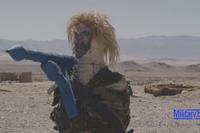A decommissioned World War II-era destroyer docked near downtown Buffalo in New York is taking on water and listing...
Survivors Recall Fall of Malaga to Francoist Troops 85 years On
In 1937, Spain was in the midst of a bitter civil war divided between right-wing Franco's Nationalists and the left-wing government of the Second Republic. (Associated Press)
In 1937, Spain was in the midst of a bitter civil war divided between right-wing Franco's Nationalists and the left-wing government of the Second Republic.
February 8 witnessed the fall of Malaga to the rebels, the right-wing nationalists who were seeking to overthrow the left-wing government.
The Republicans, whose ranks included anarchists, communists, trade-unionists and peasants were forced out the city.
The Nationalists, who were aided by Mussolini and Hitler, won the civil war in 1939, establishing Franco as a dictator who would rule Spain until his death in 1975.
An old Malaga train tunnel under the Almería highway is a monument to the victims of the Battle of Malaga.
Thousands of people from Malaga hid above the tunnels avoiding death during their exodus to Almeria.
In the sky, Nazi German planes bombed civilians, from the sea, Italian ships attacked the highway -- and the nationalist soldiers took the city.
An estimated 100,000 civilians attempted to evacuate the besieged city via the N-340 coastal highway connecting Málaga to the city of Almería.
Now 91, José Alarcón was just five years old when his family fled the small Andalusian town of Benamargosa near Málaga, where his father was the first Communist mayor.
Eighty five years later his memories are vague, but he recalls the terror he felt in the chaos of war.
"I remember, the memories are horrible, the memories are that we were walking, suddenly the canyons were felt closer and closer on one side and on the other, near Almería, and we had and had to throw ourselves on the ground, we ate sugar cane, and so on we marched, because we didn't even know where we were going to see well, the only thing that fear took us there was because it came from another direction, it came killing from Granada to here, there-- was chaos," says Alarcón.
His father was later executed for his political involvement when the right-wing Nationalist forces won the war.
His remains are missing but a memorial bears his name in the Velez-Málaga cemetery.
Another survivor, José Ruiz, now 85, is the child of a woman who fled Malaga whilst pregnant.
His mother told him that she walked more than 100 kilometres to Almeria, under constant attack.
Months later the baby would be born as a refugee.
"Planes began to arrive, according to my mother, they saw that the planes were German and the ships were Italian, and they were bombing all the way until they almost reached Almería," says Ruiz.
During the Francoist dictatorship, survivors didn't speak of their experiences fearing reprisal, and 85 years later, the history is still a taboo subject in Andalusian families.
Files have been deleted, victims are missing, graves remained unmarked.
"There are many unknowns about this event, because 85 years later we do not know the real scale of the crime, we do not know how many people really left, we do not know how many people died, we do not know where the graves are where the victims were buried, and not a single remnant of them was rescued. 85 years later there has no interest from the government in discovering the truth about the cruellest event that took place during the Spanish war in Andalusia," says Fernando Alcalde, a local researcher into the history.
Foreigners Norman Bethune, Hazen Sise and Thomas Worsley helped those fleeing down the road and captured their ordeal in photographs.
They were part of the Canadian Blood Transfusion Service, a medical health unit dedicated to bringing blood to the battlefronts during the Spanish Civil War.
Now an exhibit of the photos has opened in Malaga.
Curator Jesús Majada tells the story:
"(Norman Bethune) He said I'm going forward, I'm going forward, and he continued ahead on the road and as he advanced, approximately 100 km from Almería, that is, halfway from Malaga, of those 200 km, he met many people, an exodus from the population that leads to Almería, was the population of Malaga, it is estimated that about 100,000 people, other researchers speak of a lot more people. They met people who lived in the city fleeing the repression of the fascist army, the Francoist army. So for three days and three nights after installing all the blood transfusion devices, they were taking the refugees, especially children and women to half the way from Castell del Ferro to Almería for three days," says Majada.
About 32,000 international volunteers joined the International Brigade on the side of the elected Spanish government.
Across Spain, tens of thousands of civil war victims remain in unmarked graves.



